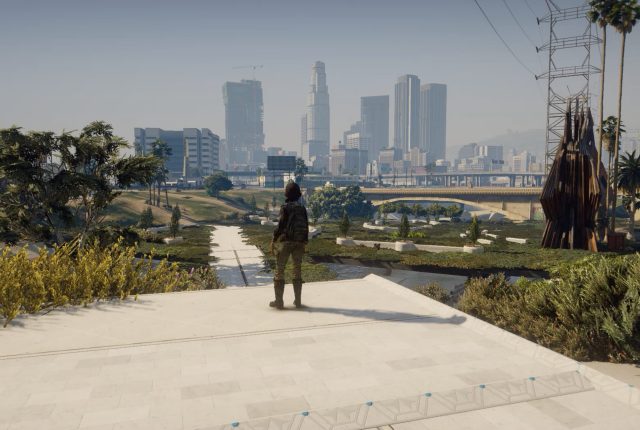UCLA storytellers use Grand Theft Auto as basis for series of original films imagining L.A. in 2050
Emma Horio I UCLA

It’s the year 2050, and the Los Angeles River runs lazily along, sparkling in the sunlight, as the hum of freeway traffic weaves through the idyllic setting. Standing on the riverbank, teenagers Kerstin and Yolanda agree to work together to hunt down a lost electronic toy. Will their mission, and their friendship, survive in spite of their socioeconomic differences?
Kerstin and Yolanda are characters in a short film produced by UCLA faculty, students and alumni. But they’re not played by actors; they’re computer-generated avatars. And the landscapes and neighborhoods they’re about to explore weren’t filmed in present-day Los Angeles, but rather produced using a modified, or “modded,” version of the video game Grand Theft Auto V.
It’s all part of a project called “Grand Theft Eco,” a series of three short films created over the past five years by a team led by English professors Ursula Heise and Danny Snelson under the auspices of UCLA’s Laboratory for Environmental Narrative Strategies, or LENS.
A world-building experience
Close to two dozen undergraduates and graduate students collaborated on the effort — writing the scripts, voice-acting the characters and reprogramming the video game’s infrastructure to function as the “sets” for their stories. The series explores questions about Los Angeles’ environmental future and related issues of economic and social justice, and each episode has its own theme: the revitalization of the Los Angeles River, private–public competition over electric power, and urban wildlife.
Producing “Grand Theft Eco” was both a cinematic and world-building endeavor: Even before filming began, the team had to painstakingly mod the environments and settings of Grand Theft Auto to bring to life a new vision of Los Angeles’ environmental future. In Grand Theft Auto, gamers compete as criminals in a fictional city called Los Santos, which is modeled after Los Angeles.
The game has a reputation for violent and misogynistic content, but the UCLA team had other plans for their modded version. The filmmakers worked in the video game’s code to redesign parts of Los Santos, taking into account real-life plans that have been laid out for Los Angeles.
Read the full story.
Pictured above: A still from the Grand Theft Eco videos. Angel Tolentino, a former UCLA student who worked on the movies, said, “To build a better world, we must envision one. I think this is a creative step in the right direction.” (Image courtesy of UCLA Laboratory for Environmental Strategies)